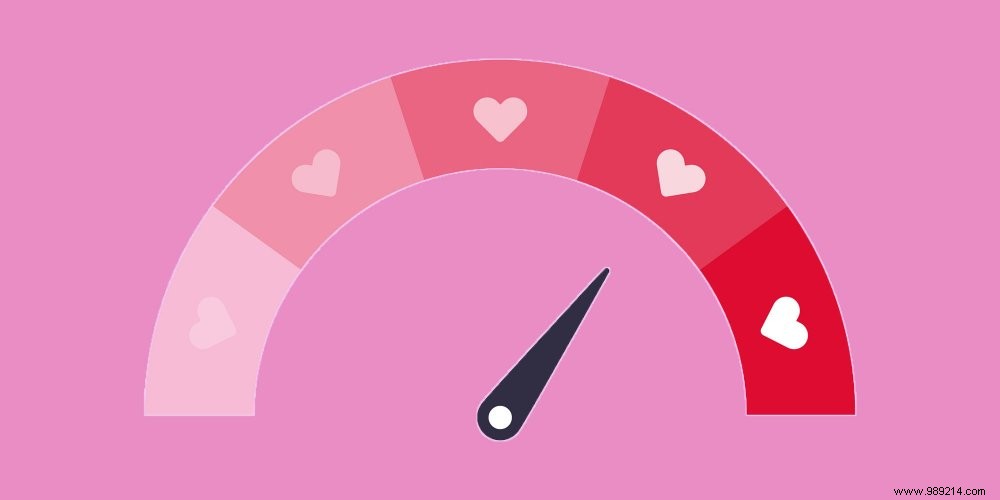 Exacerbated perception of heartbeats, stronger, faster heartbeats… These disorders are benign in 90% of case. But if the palpitations persist, it is better to consult because they can reveal a health problem that should not be overlooked.
Exacerbated perception of heartbeats, stronger, faster heartbeats… These disorders are benign in 90% of case. But if the palpitations persist, it is better to consult because they can reveal a health problem that should not be overlooked. Heart rate is a good indicator of our physical condition. When the heart rate accelerates for no apparent reason and exceeds 100 beats per minute, it is called tachycardia . At rest, the heart usually beats 60 to 80 times per minute. But a young athlete can easily go down to 40 – or even 30 – beats per minute. And conversely, a less athletic person sees his heart rate reach 180 during an unusual physical effort.
The heart can also race during a romantic encounter, a fit of anger or a decisive job interview or during a period of intense stress. These accelerated beats, which seem to thump in the chest, are completely normal.
However, if palpitations occur for no apparent reason, it is important to pay attention to them and find the cause.
Who says acceleration of the heart does not necessarily say heart problem. Too much caffeine, amphetamine or cocaine can cause bothersome palpitations. These stimulants induce surges of adrenaline which raise the heart rate. Their increased consumption can even give the impression that the heart stops suddenly, before starting again as if nothing had happened. This creates stress which amplifies the heart ruckus because the stress hormone - cortisol - also boosts the tempo of the heart.
Severe hypoglycaemia (fall in blood sugar level, editor's note), alcohol ingestion or high fever can also increase heart rate.
Video of the day:Also, during pregnancy, many women experience palpitations as their heart is under extra work. In addition to its usual activity, it must send blood to the placenta in order to provide oxygen and nutrients to the baby. But if the phenomenon worries you, talk to your gynecologist or your obstetrician.
“Many over-the-counter cold or flu pills contain stimulants, such as pseudoephedrine or phenylephrine, which cause the blood vessels in the nose to constrict to reduce mucus production, explains Dr. Christopher Kelly, professor of medicine at Columbia University and author of A Practical Guide to Symptoms (ed. Leduc.s). Taking them can also increase blood pressure and cause palpitations."
Quickly stopping beta-blocker drugs – intended to regulate blood pressure – is also sometimes a source of palpitations, as are bronchodilator sprays used to thwart asthma or COPD (chronic obstructive pulmonary disease).
When the thyroid gland goes into overdrive, the heart speeds up. Weight loss, diarrhea and an increase in body temperature (sweating hands, sweating, etc.) are frequently associated. If this is your case, talk to your doctor. He will order blood tests and a thyroid ultrasound to check for hyperthyroidism.
Anemia can also be the cause of palpitations because the heart must redouble its efforts to compensate for the lack of hemoglobin. By pumping more, it increases the volume of blood propelled into the body in order to maintain good oxygenation of all organs. Very heavy periods or insufficient dietary iron intake (unbalanced vegan diet, for example) may be the cause.
Dehydration also leads to palpitations and irregular heartbeats, often accompanied by dry mouth and cramps. This is why it is important to drink more in summer because the loss of fluids – due to sweating – lowers blood pressure.
Finally, a tachycardia can obviously be the sign of a cardiac pathology (hypertension, atherosclerosis, valvulopathy, cardiomyopathy...).
If the unexplained episodes are repeated or worsen, a check-up with the cardiologist is necessary, especially when a feeling of malaise, shortness of breath or chest pain on exertion are associated.
This medical specialist will have you undergo various tests (electrocardiogram, cardiac ultrasound, etc.) to ensure that your coronary arteries are not blocked or that the atria of your heart are not contracting in an anarchic way (atrial fibrillation). This screening is important because drug or surgical treatments can be put in place to avoid unnecessary complications.
“Plapitations and chest pain at rest, on the other hand, constitute an emergency,” warns Dr. Kelly. Immediately call the SAMU:dial 15 on a landline or 112 on a smartphone. Likewise, if your palpitations are accompanied by dizziness, go to the emergency room quickly.
*Handy Guide to Symptoms by Dr. Christopher Kelly, ed. Leduc.s. Available on Place des libraires and Amazon
Read also: